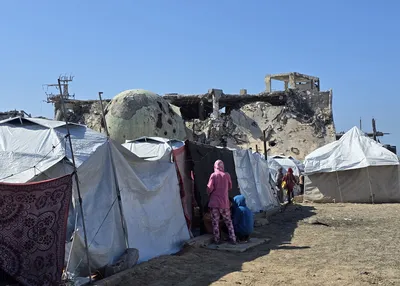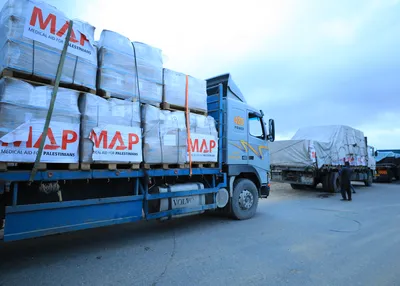Gaza’s hospitals still face dangerous shortages as lifesaving aid remains blocked by Israel
Israel’s restrictions on aid entry mean hospitals remain overstretched with critically injured and malnourished patients, and medical supplies have still not meaningfully increased since the start of the ceasefire agreement on 10 October. Testimonies gathered by Medical Aid for Palestinians (MAP) from three major hospitals it supports – Shifa, Nasser and the Patient’s Friends Benevolent Society (PFBS) hospitals – reveal a healthcare system unable to recover without immediate and unrestricted humanitarian access.
Less than 5% of the aid offloaded from trucks in Gaza has been medical supplies, despite the immense needs faced by hospitals following two years of Israel’s genocide.
Staff at the three hospitals report facing severe shortages in essential drugs and supplies, including IV fluids, anaesthesia medications, gauze and vital drugs for chronic conditions. This includes fundamental items required to keep emergency and surgical services functioning.
Alaa Al Shurafa, MAP’s Medical Supervisor at Shifa Hospital, Gaza’s largest hospital, said: “There has been no real increase in medical aid since the ceasefire, and the situation has not improved at all”.
Nasser Hospital, the backbone of the health system in southern Gaza, has 42 essential medical items at zero stock and 43 more nearly depleted.
Omar Al Shaer, MAP’s Medical Supervisor at Nasser Hospital, warns that the lack of supplies is costing the lives of patients: “These are essential medicines, and their absence directly affects patients’ ability to receive the treatment they need. One of the most critical missing medicines is a lifesaving drug for kidney dialysis patients*. Many patients have died due to the unavailability of this medication. Efforts to locate it in the local market have failed, and Israeli authorities continue to prevent its entry into Gaza.”
Around 350,000 people in Gaza are living with chronic medical conditions, including more than 1,100 patients in need of kidney dialysis to maintain life.
PFBS Hospital, which operates crucial paediatric and neonatal intensive care units (NICUs) in northern Gaza, reports critical shortages of medicines, cleaning materials and sterilisation supplies. Orthopaedic staff at Nasser and Shifa have reported being forced to re-use items like external fixators for amputees and remove them from other patients who still need them, which increases the risk of infection and hinders recovery from limb loss.
Dr Majd Awadallah, Medical Director of PFBS, said: “We have a shortage of everything: space, facilities, staff, medicines and medical supplies. These problems are unsolvable without opening the crossings and allowing the unconditional entry of essential materials, especially medicines. How can a hospital operate in surgical and maternity cases without cleaning materials?”
Hospitals are also facing shortages of key medical equipment, which is forcing patients to go without critical care.
A damaged CT scanner has left Shifa hospital unable to conduct essential imaging for trauma patients. During the Israeli military's invasion of Gaza City in September, a second CT scanner was damaged**. There is now only one functioning CT machine in northern Gaza, at Al-Ahli Hospital. This is placing massive pressure on a single facility and forcing clinicians to ration imaging to the most critical cases and has disrupted MAP's own diagnostic referrals. Shifa also remains the only facility in northern Gaza providing dialysis services, but is over its caseload, operating 32 machines for nearly 200 patients.
Dr Majd highlighted the problems PFBS Hospital faces due to the lack of an ultrasound machine (used to see inside the bodies of patients without surgery or X-rays): “This machine does not pose any danger but, more than a month since the ceasefire, it is still not available. Medical intervention was not enough to save the lives of children, so we lost a large number of them in the intensive care unit.”
Only half of Gaza’s hospitals remain partially functional and there are still no fully functioning hospitals following two years of systematic attacks on healthcare by the Israeli military. The Ministry of Health in Gaza reported this month that essential medicine shortages exceed 56% and shortages of medical supplies exceed 65%.
MAP and our partners are ready to scale up our services, but we cannot do this while aid is blocked and crossings are closed. As the occupying power, it is Israel’s obligation under international law to ensure the entry of lifesaving aid into Gaza. The UK and other governments must pressure Israel to immediately end its siege, open all crossings and allow a surge of aid across Gaza. Without a flood of aid and assistance, we will see more avoidable deaths and deprivation.


